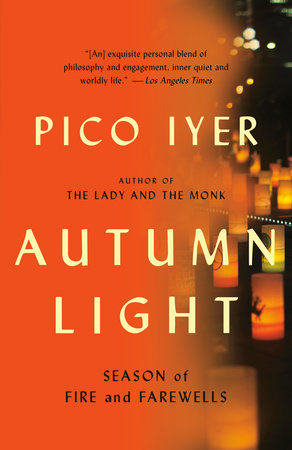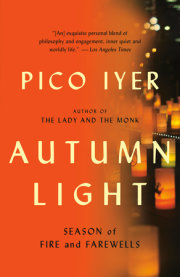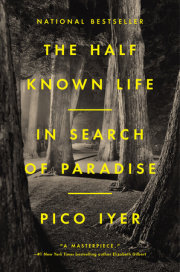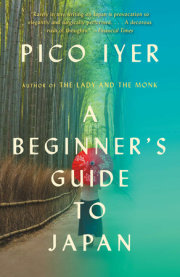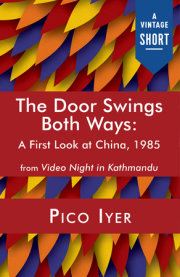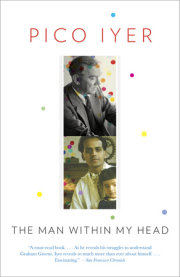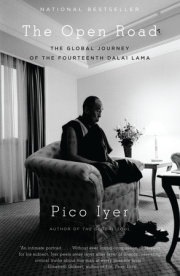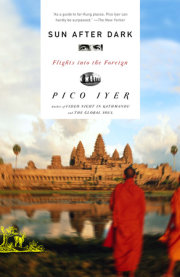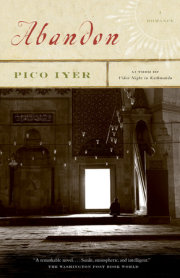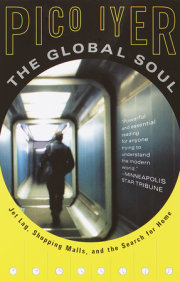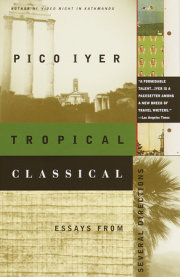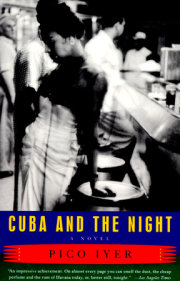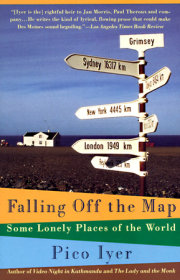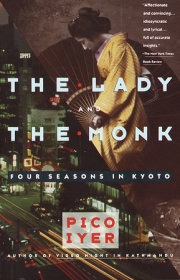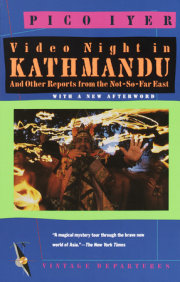Excerpted from Autumn LightNow, as we head out into the sunshine—the northern hills of Kyoto are a blaze of russet, burnt umber, orange, under late-autumn skies of depthless blue—we’re ushered into a backstage room of sorts, before an afternoon conversation between the Dalai Lama and a celebrated novelist.
There are only four of us in the space: the Dalai Lama, Hiroko and myself, and a Californian monk from the Dalai Lama’s temple who’s also in our small traveling party.
“So,” says the Tibetan, “what is the point of art? What is the larger purpose?”
Startled, I cite the Sixth Dalai Lama, famous for his poems and songs.
The Dalai Lama doesn’t look very interested.
The monk mentions Milarepa, the mystic who composed poems in a cave.
The Dalai Lama looks dissatisfied.
In his way of thinking, looking closely at reality is the only thing that matters, not all the ways we make embroidered designs around it.
I recall the November day two years ago when all of us traveled up with him to a fishing village north of Tokyo laid waste by the tsunami of eight months earlier. A few miles out of the city of Sendai, we began passing along clean, modern roads lined by nothing but compacted trash, block-long rectangles of smashed cars and refuse. Telephone poles listed at forty-five-degree angles; a solitary chair sat in the open skeleton of what had once been a living room. Buses bobbed on the water beside us. When we pulled up at Ishinomaki—hundreds had gathered along the road there, behind ropes, to greet the famous visitor—it was to see nothing but a flattened landscape, which looked like pictures I’d seen of Hiroshima after the atom bomb. More than three thousand had lost their lives in this village alone, many of them children; nineteen thou- sand had lost their homes.
The Dalai Lama stepped out of his car and strode without hesitation to the people, mostly women, who had assembled in the street to see him. Many were sobbing, or calling out, in limited English, “Thank you, thank you.” He held one person’s head against his chest; he blessed another. He touched heads, shook hands, looked deep into one set of eyes, then another, asking, “What do you feel? . . . Are you still sad?”
“Please, be brave,” he told them, as the women sobbed and others pushed forwards. “Please, change your hearts. You cannot change what has happened. Please help everyone else, help others become okay.”
The crowd fell quiet; some of its members nodded.
“Too many people died,” he went on. “If you worry, it cannot help them. Please, work hard. That is the best offering you can make to the ones you lost. Rebuild your community as your country rebuilt itself after the war.”
It’s the kind of advice that anyone might give, perhaps, but when he turned around, to walk towards the temple that had survived, gravestones in the foreground tilted crazily over or knocked down entirely, I saw the Dalai Lama take off his glasses and wipe away a tear himself.
Suffering is the central fact of life, from his Buddhist viewpoint; it’s what we do with it that defines our lives.
Now, as he gathers his robes o stage, peering down to see how the theater’s sound system works, I think of how, when we went into the temple in Ishinomaki, it was to see the bones of the lost, tidily gathered and placed in brightly colored boxes by the altar, under framed photographs, maybe fifty of them in all; in every case, Hiroko explained, there was no survivor to claim the remains, as Japanese custom decrees. “All lose parent,” she told me of the five-year-old boys lined up cheerfully in uniform to shake the Dalai Lama’s hand in the autumn sun.
After taking his place in front of the altar, the Dalai Lama began to speak, recalling the afternoon he had been told, at the age of twenty-three, that he had to leave his home, as well as his homeland, that very evening, if both of them were not to be destroyed. No time to say goodbye to his friends, no chance to take his small dog. Two days later, as he was crossing the Himalayas towards exile, a new life, he heard that many of his friends were dead.
At the end of today’s session, we return with the Dalai Lama and his bodyguards and monks and secretaries to his hotel, hasten up in the elevator to the top floor and walk at high speed down the corridor with him to his room. His eyes are often red after a long day of events, but his pace never slackens. He’s holding Hiroko’s hand as he moves forwards; as in a physical expression of his teachings, he reflexively reaches for any set of hands to grasp between his own as he strides along.
Just before we arrive at his door, Hiroko says, “Your Holiness, we must leave you now. But thank you for everything.”
He’s on his way to Tokyo next day; we have obligations at home.
“Also,” she says—her voice falters just a little—“I want to tell you: my father passed away this year.”
Instantly the fast-stepping monk stops. He looks at her directly, deep into her eyes.
“When?”
“This year.”
“What cause?”
“No cause. He was old. His body was tired.”
He steps forwards and holds her for a long, long time.
Then he steps back and looks searchingly at her. “Remember: Only body gone. Spirit still there. Only cover gone.”
He heads into his room and, at the threshold, turns around to wave at us briskly. “Good night, thank you.” And then is gone as we head back into the golden flares of late afternoon.
Copyright © 2019 by Pico Iyer. All rights reserved. No part of this excerpt may be reproduced or reprinted without permission in writing from the publisher.

